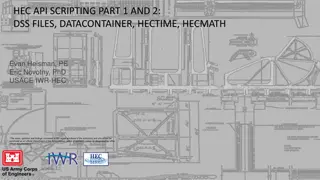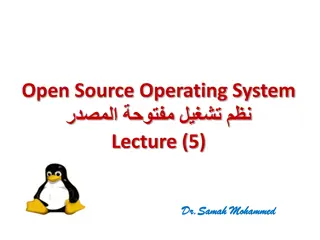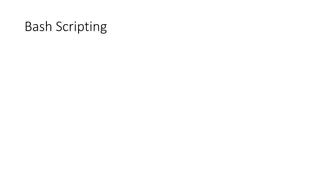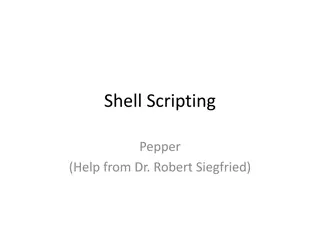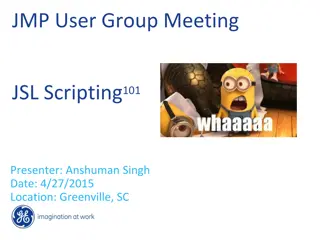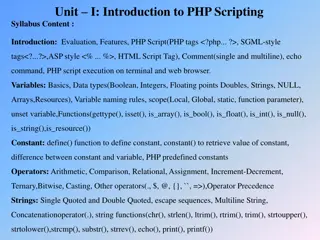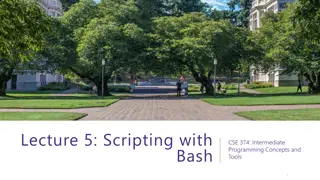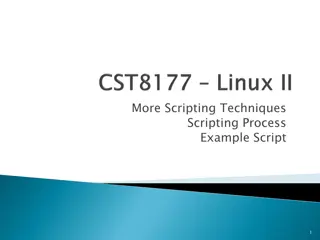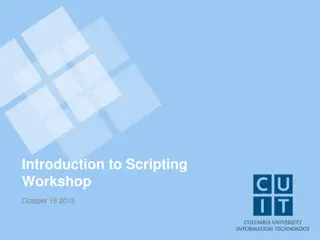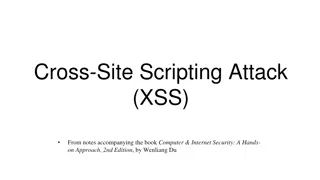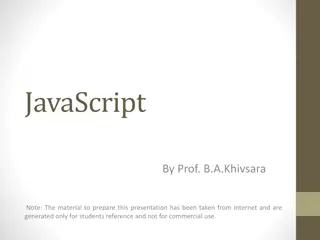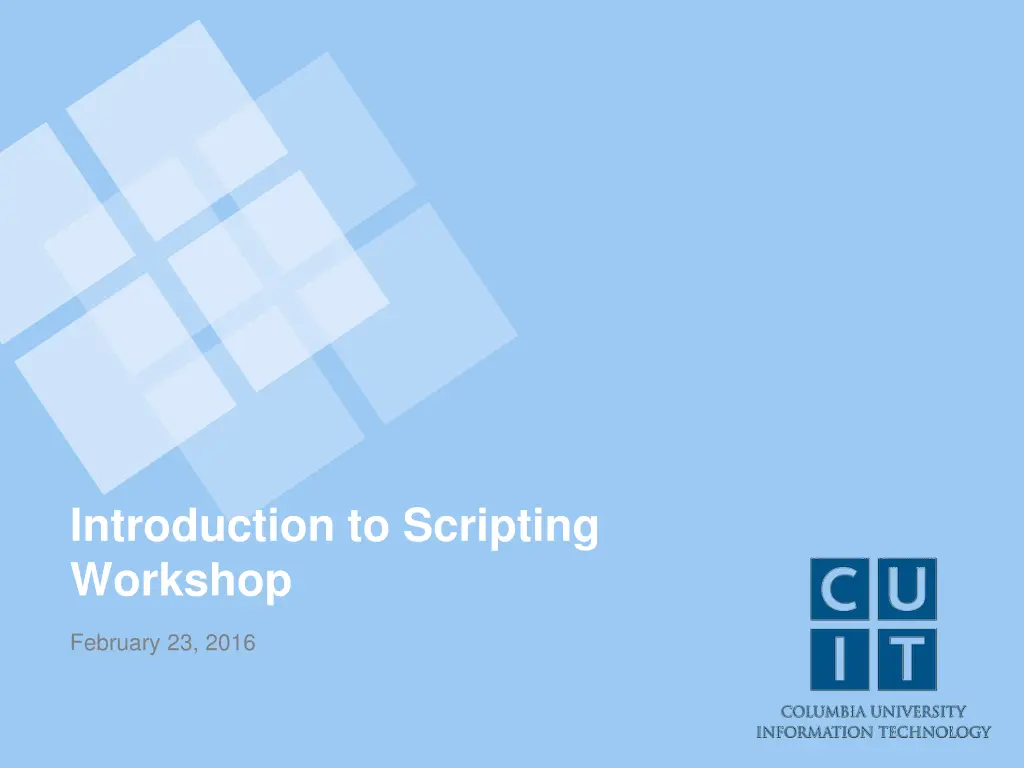
February Scripting Workshop
Join George Garrett and the HPC Support Team for an Introduction to Scripting Workshop on February 23, 2016. Learn about scripting, shell scripts, and why they are essential. Discover valuable resources for Linux scripting and access instructions for both Windows and Mac users.
Download Presentation

Please find below an Image/Link to download the presentation.
The content on the website is provided AS IS for your information and personal use only. It may not be sold, licensed, or shared on other websites without obtaining consent from the author. If you encounter any issues during the download, it is possible that the publisher has removed the file from their server.
You are allowed to download the files provided on this website for personal or commercial use, subject to the condition that they are used lawfully. All files are the property of their respective owners.
The content on the website is provided AS IS for your information and personal use only. It may not be sold, licensed, or shared on other websites without obtaining consent from the author.
E N D
Presentation Transcript
Introduction to Scripting Workshop February 23, 2016
Introduction George Garrett & The HPC Support Team Research Computing Services CUIT
Introduction Please Leave Feedback
Introduction Slides will be sent out afterwards.
Introduction What is a script?
Introduction What is a shell script?
Introduction What is a shell script? A file with shell commands.
Introduction Why use scripts?
Scripting Resources How Linux Works by Brian Ward Available as an E-book from Columbia University Libraries and at Safari Books Online
Scripting Resources Shell and Scripting Tutorial http://linuxcommand.org/
Scripting Resources Advanced Bash-Scripting Guide http://tldp.org/LDP/abs/html/
Cunix System: cunix.columbia.edu User: Your UNI
Access Windows Instructions 1. Search for putty on Columbia home page 2. Select first result 3. Follow link to Putty download page 4. Download putty.exe 5. Run putty.exe
Access Mac Instructions 1. Run terminal
Access Mac (Terminal) $ ssh UNI@cunix.columbia.edu Windows (Putty) Host Name: cunix.columbia.edu
Access Does everyone have access?
Quick Review shell $ pwd cd . ls user interface to the system standard prompt symbol print working (current directory) change directory current directory list directory contents
Quick Review cat sort grep echo hi sleep 5 man print a file sort the lines of a file print lines matching a pattern print hi wait 5 seconds command manual
Workshop Setup $ mkdir workshop $ cd workshop $ cp /tmp/workshop/* .
Command Line Example Word Count from Data Science at the Command Line - Jeroen Janssens
Lets Download Some Data Gutenberg Project: http://www.gutenberg.org Which famous novel should we use? Download plain text version using curl $ curl [URL] > novel.txt Trim header and footer, leaving only main text
Pipes $ cat alice.txt | grep rabbit Pipes connect output from one command to the input of another command
Pipes $ cat alice.txt | grep rabbit | sort You can keep on combining commands with more pipes.
Pipes $ cat alice.txt | grep rabbit | tr r w tr translate characters
wcount $ cat wcount cat alice.txt | tr
wcount $ wcount
wcount $ wcount -bash: wcount: command not found
wcount $ ./wcount
wcount $ ./wcount -bash:./wcount:Permission denied
wcount $ ls l wcount
wcount $ ls l wcount -rw-rw---- [ snip ]
wcount $ ls l wcount -rw-rw---- $ chmod +x wcount [ snip ]
wcount $ ls l wcount -rw-rw---- $ chmod +x wcount $ ls l wcount -rwxrwx--x [ snip ] [ snip ]
wcount $ ./wcount Should work this time.
file Determine type of file. $ file wcount
file Determine type of file. $ file wcount wcount: ASCII text
wcount Choose an editor nano Recommended default vi emacs
nano Nano commands are on back of cheat sheet. ^ means hold down control
Edit wcount $ nano wcount
#! Add #! to first line #!/bin/sh cat alice.txt | tr
#! $ ./wcount Still works.
#! Some #! first lines you might see #!/bin/sh #!/bin/bash #!/usr/bin/perl #!/usr/bin/python
file Has the file type changed? $ file wcount wcount: POSIX shell script text executable
Variables $ file=alice.txt $ echo $file alice.txt
Variables 1. Add file=alice.txt to wcount. 2. Replace cat alice.txt with cat and the variable.
Variables #!/bin/sh file=alice.txt cat $file | tr
Variables You could put $file in double quotes. Why put quotes around $file? cat $file | tr
Command Line Parameters We re going to change wcount so any file can be specified from the command line. $ ./wcount moby.txt
Command Line Parameters Change wcount so any file can be specified from the command line. $ ./wcount moby.txt $1
Command Line Parameters 1. Create a new file named param 2. Put the #! directive on the first line 3. On next line type: echo $1 4. Save and make executable 5. Run it

